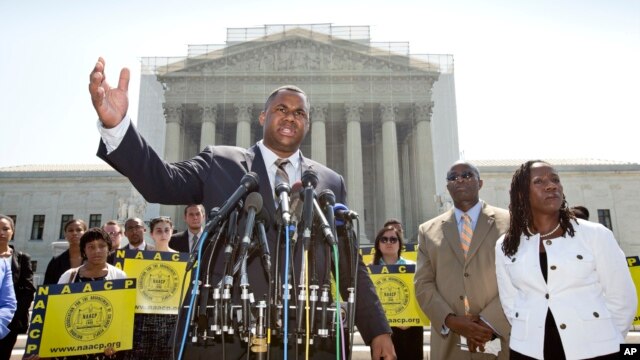
Ryan P. Haygood, director of the NAACP Legal Defense Fund, talks outside the Supreme Court in Washington, June 25, 2013, about the Shelby County v. Holder, a voting rights case in Alabama.
The U.S. Supreme Court has struck down a key provision of the country's voting rights law that protected against racial discrimination in states where segregation of blacks and whites was enshrined in law in the 1960s.
The high court ruled Tuesday in a 5-4 vote that the review of voting rights provisions in nine states with a segregationist past was no longer necessary because "flagrant" or "pervasive" violation of the rights of black voters no longer exists.
The court said that in 2006 when Congress reauthorized the 1965 law calling for federal government review, it failed to take into account widespread racial progress in the country. The court said that Congress instead re-enacted the review "based on 40-year-old facts having no logical relation to the present day."
The decision, written by Chief Justice John Roberts for a conservative court majority, said Congress could craft an up-to-date formula for deciding which states' voting policies still need to be reviewed by the federal government. But in politically-charged Washington, where Republican and Democratic lawmakers are often at odds on a host of issues, the passage of such legislation is doubtful.
In her dissent, Justice Ruth Bader Ginsburg said the decision "terminates the remedy that proved to be the best suited" to thwart voting discrimination.
U.S. President Barack Obama, the country's first black president, said he was "deeply disappointed" by the ruling. He said overturning the federal review of the state voting laws "upsets decades of well-established practices that help make sure voting is fair." The president called on Congress to approve new legislation "to ensure every American has equal access to the polls."
With the court ruling, new voter identification laws in several states will be allowed to take effect without federal government review for their fairness, and whether they would affect the turnout of minority voters. |
|
